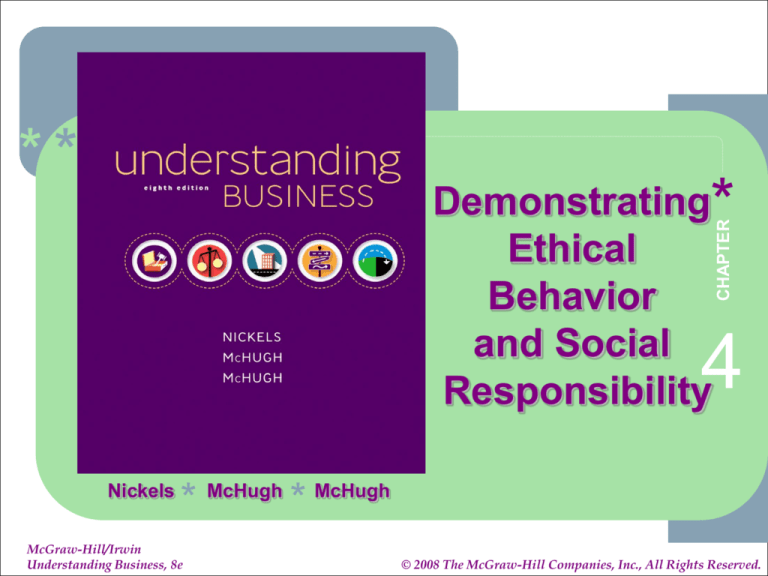
*
*
*
**
CHAPTER
*
Demonstrating
Ethical
Behavior
and Social
Responsibility
4
Nickels
*
McGraw-Hill/Irwin
Understanding Business, 8e
McHugh
*
McHugh
1-1
4-1
© 2008 The McGraw-Hill Companies, Inc., All Rights Reserved.
*
*
*
Top U.S. Ethical Issues
Improper Accounting Practices
Deceptive Sales/Marketing Practices
Conflicts of Interest
Lying on Reports/Falsifying Records
Dishonesty with Customers
Lack of Public Trust in Corporate America
Bribes and Kickbacks
Unfair Treatment of Employees/Customers
Securities and/or Bank Fraud
Discrimination
Producing Low-quality or Unsafe Products
0%
Source: CMO Magazine, October 2004
10%
20%
30%
40%
50%
60%
4-2
*
*
*
Ethics of MBA Students
Percent of MBA Students Who Would:
• Buy Stock on Inside Information
52%
• Reveal Corp. Secrets to Spouse/Family
50%
• Let a Gift Sway Purchasing Decision
26%
• Pay Someone Off to Close a
13%
Business Deal
Source: USA Today
4-3
*
*
*
Ways to Prevent
Unethical Behavior
Increasing Penalties
for Offenders
Employee Education
Programs
Publicity About Those
Being Punished
A Code of Conduct
Adding Ethics Classes
to College Programs
New Laws
0%
Source: CMO Magazine, Oct. 2004
10%
20%
30%
40%
50%
60%
70%
80%
4-4
*
*
*
Social Responsibility
CORPORATE SOCIAL RESPONSIBILITY
(CSR)
is a business’s concern for welfare of
society.
It is based on a company’s concern for the
welfare of all its stakeholders, not just the
owners.
Some CRITICS of CSR believe that a
manager’s sole role is to compete and
win.
4-5
*
*
*
Codes of Ethics
Milton Friedman
stated that the only social responsibility of
business is to make
money for stockholders.
DEFENDERS argue that CSR makes more
money for investors in the long run.
One study showed a positive correlation between
CORPORATE SOCIAL PERFORMANCE
and
CORPORATE FINANCIAL PERFORMANCE.
4-6
*
*
*
Ethics
I. ETHICS IS MORE THAN LEGALITY
Learning Goal 1
Explain why legality is only the first step in behaving
ethically.
A. Ethical Standards Are Fundamental
B. Ethics Begins with Each of Us
Learning Goal 2
Ask the three questions one should answer when
faced with a potentially unethical action.
4-7
*
*
*
Ethics Check Questions:
• Is It Legal?
• Is It Balanced?
• Is it Fair ?
• How Will It Make Me Feel About
Myself?
4-8
*
*
*
Factors Influencing
Managerial Ethics
Individual
• Values
• Work
Background
Organizational
Environmental
• Top Level Mgmt.
Philosophy
• Competition
• Family Status
• The Firm’s
Reward System
• Personality
• Job Dimensions
• Economic
Conditions
• Social/Cultural
Institutions
4-9
*
*
*
Codes of Ethics
• Compliance-Based
• Integrity-Based
4-10
*
*
*
Codes of Ethics
COMPLIANCE-BASED ETHICS CODES
are ethical standards that emphasize
preventing unlawful behavior by
increasing control and by penalizing
wrongdoers.
4-11
*
*
*
Codes of Ethics
INTEGRITY-BASED ETHICS CODES
are ethical standards that define the
organization’s guiding values, create
an environment that supports
ethically sound behavior, and stress
a shared accountability among
employees.
4-12
*
*
*
Ethics
.
II. MANAGING BUSINESSES ETHICALLY
AND RESPONSIBLY
Learning Goal 3
Describe management’s role in setting ethical
standards.
Setting Corporate Ethical Standards
Learning Goal 4
Distinguish between compliance-based and
integrity-based ethics codes, and list the six
steps in setting up a corporate ethics code.
4-13
*
*
*
Ethics
III. CORPORATE SOCIAL RESPONSIBILITY
Learning Goal 5
Define corporate social responsibility and examine corporate
responsibility to various stake-holders.
A. Responsibility to Customers
B. Responsibility to Investors
C. Responsibility to Employees
D. Responsibility to Society and the Environment
E. Social Auditing
4-14
*
*
*
Codes of Ethics
CORPORATE AND CRIMINAL FRAUD
ACCOUNTABILITY ACT
(Sarbanes-Oxley, 2002)
4-15
*
*
*
Steps to Improve
U.S. Business Ethics
1. Top management support
2. Employees’ understanding
3. Managers’ training
4. Ethics Office
5. Outsiders must be informed
6. Enforcement of ethics code
4-16
*
*
*
Social Audit
• Company
• Outside Groups that serve
as watchdogs:
• Socially-Conscious
Investors
• Environmentalists
• Union Officials
• Customers
4-17
*
*
*
Ethics
IV. INTERNATIONAL ETHICS AND SOCIAL
RESPONSIBILITY
Learning Goal 6
Analyze the role of American businesses in
influencing ethical behavior and social
responsibility in global markets.
4-18
*
*
*
International Ethics
and Social Responsibility
• Ethical problems are Not Unique to
the U.S. managers
• Demand for Socially Responsible
Behavior from Global Suppliers
• Joint Initiative on Corporate
Accountability and Workers’ Rights
• Inter-American Convention Against
Corruption
4-19
*
*
*
Best Company Reputation
• Johnson & Johnson (80.6)
• Coca-Cola (79.7)
• Google (79.5)
• UPS (79.4)
• 3M (78.8)
Source: USA Today
4-20
Most Admired
Global Companies
*
*
*
1.
General Electric
6. Microsoft
2.
Toyota
7. Dell
3.
Procter & Gamble
8. Berkshire Hathaway
4.
FedEx
9. Apple Computer
5.
Johnson & Johnson
10. Wal-Mart
Source: Fortune, 2006
4-21
*
*
*
Levels of Corporate
Social Responsibility
Societal Responsibility
Stakeholder Responsibility
Ecological
General
Customers Profit Responsibility
Environment
Owners/Stockholders Employees
Public
Suppliers/Distributors
Public Interest Groups
Source: Marketing, 5/E by Berkowitz, Kerin, Hartley, and Rudelius.
4-22






